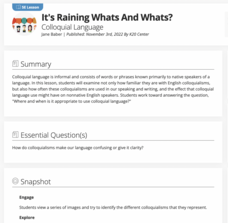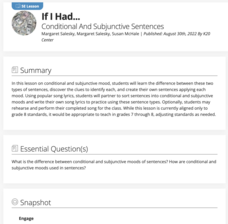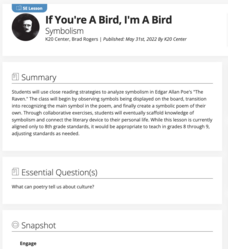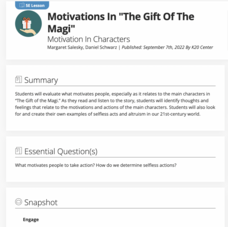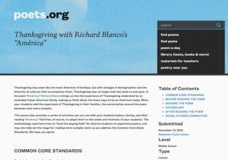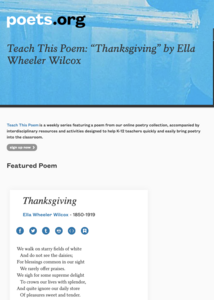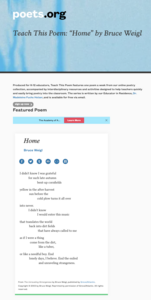K20 LEARN
It’s Raining Whats and Whats? Colloquial Language
"Yuns betta outten the lights!" Colloquial language is the focus of a lesson that asks middle schoolers to consider the pros and cons of using idioms. They read articles, match expressions with their meaning and place of origin, and...
K20 LEARN
It’s All Greek to Me: Greek and Latin Roots
Ancient Greeks and Romans have contributed far more to modern culture than mythic heroes and stunning architecture. Greek and Latin roots are the foundation of many English words. Middle schoolers engage in an activity that asks them to...
K20 LEARN
Mob Mentality and "The Outsiders": Integrating Fiction and Nonfiction
S. E. Hinton's The Outsiders allows middle schoolers to reflect on mob mentality. After reading an article and watching a video about herd mentality, class members find examples in the novel of when characters go along with the crowd and...
K20 LEARN
Multimodal Narrative Writing: Thumbprint Autobiography
Thumbprints, like people, are unique. Middle schoolers watch videos that explain how fingerprints are created and why they are unique. Learners then respond to guiding questions about themselves and use these details to create their...
K20 LEARN
If I Had... Conditional and Subjunctive Sentences
Lines from popular songs are used to teach middle schoolers about conditional and subjunctive moods. Groups engage in a card sort activity to identify conditional and subjective sentences and then partners draft sentences of each type....
K20 LEARN
If You Give a Mouse a Cookie: Conditional Statements
If, then, Else is not only a basic programming language command, it is also the basis for conditional statements used in writing. Middle schoolers try to craft conditional statements with a card sort activity and then collaborate on a...
K20 LEARN
Sweet and Savory Writing: Descriptive Writing
The engagement is in the details. Young scholars learn the benefit of weaving descriptive and sensory details into the fabric of their writing through the activities in this lesson. As their hands explore items concealed in bags, a...
K20 LEARN
Is Pizza Epic? Word Choice
Remember when everything was Fantastic! Fabulous! Awesome! Iconic! A series of activities encourages young writers to move beyond these overused descriptors and instead choose a more precise language.
K20 LEARN
Nose Like a Cherry: Understanding Similes and Metaphors
Clement Moore's "Twas the Night Before Christmas" models the power of descriptive language for middle schoolers. They identify the similes and metaphors in the tale and consider what these descriptions add to the story's emotional...
K20 LEARN
No Imitations, Please! Avoiding Plagiarism
With all the stuff available online, good essays are just a click away. But talk about tracking! Writers beware! New tech can now identify plagiarism, and the consequences of presenting someone else's work as your own are severe. Here's...
K20 LEARN
More than Meets the Eye: Direct and Indirect Characterization
Willy Wonka takes center stage in a lesson about direct and indirect characterization. Scholars read a passage from the story about Wonka's Grand Entrance and watch a film clip of the same, noting examples of direct and indirect...
K20 LEARN
Introduction to Expository Writing
Move beyond the five-paragraph essay with a lesson introducing young writers to various forms of expository writing. Class members examine description, cause and effect, problem solution, sequence, and comparison forms. They create an...
K20 LEARN
If You're a Bird, I'm a Bird: Symbolism
Would a bluebird be as scary as a vulture? Edgar Allan Poe's "The Raven" is the central text in a lesson about symbolism. After a close reading of the poem, learners consider what the raven might represent to the narrator. They then...
K20 LEARN
Motivations In "The Gift Of The Magi": Motivation In Characters
O. Henry's short story, "The Give of the Magi," launches a study of what motivates people to act as they do. Class members identify what they believe are the motivations of the characters in O. Henry's tale and then craft a one-page...
Global Oneness Project
The Importance of Indigenous Language Revitalization
Middle schoolers consider languages as representations of cultures and the importance of preserving various languages, especially the rapidly disappearing languages of indigenous peoples, in a lesson that tells the story of Marie Wilcox...
Curated OER
Celebrate Joy Harjo: The First Native American Poet Laureate
Introduce middle schoolers to Poet Laureate Joy Harjo with a lesson that not only explains the role and duties of the Poet Laureate but also contains a video in which Harjo explains what she sees as her responsibility as a Native...
Academy of American Poets
Thanksgiving with Richard Blanco's "América"
Traditions, like the times, are a-changin'. Middle schoolers conduct a close reading of Richard Blanco's poem "América" and consider how Blanco's family approached his suggestions for adopting a new approach to their Thanksgiving meal.
Penguin Books
A Guide to the Works of Jacqueline Woodson
The works of Jacqueline Woodson introduce readers to diverse characters and themes. A guide covers many of the author's best-known books such as Brown Girl Dreaming and Locomotion. Dive & Discuss and Explore & Extend activities...
Academy of American Poets
Teach This Poem: “Thanksgiving” by Ella Wheeler Wilcox
Victor Laredo's painting "On the Beach" and Ella Wheeler Wilcox's poem "Thanksgiving" allow young scholars to use their noticing skills. Class members identify elements of the painting the artist uses to create the feeling of his work....
K20 LEARN
The New Colossus: Determining Author's Perspective
Introduce young scholars to the concept of the author's perspective with a lesson that uses Emma Lazarus's poem, "The New Colossus," as the anchor text. Groups use a T-chart to identify words that reveal the author's point of view of The...
Academy of American Poets
Teach This Poem: “Home” by Bruce Weigl
A poetry lesson takes a close look at home. Scholars discuss with partners what they are most grateful for at their homes. A timelapse video showcases potato tubers growing. While watching, pupils write down what they notice. Learners...
K20 LEARN
We've Got Character! Literary Analysis: Characterization
How authors bring characters to life and make them believable is the focus of a lesson on characterization. Readers closely examine passages from To Kill a Mockingbird and Dreamland Burning, noting details that reveal the character's...
Academy of American Poets
Teach This Poem: “One day is there of the series” by Emily Dickinson
A instructional activity begins with learners saying three words they associate with Thanksgiving dinner. They examine a picture of a menu from a Thanksgiving meal and discuss what they believe the artist wants them to feel, pointing out...
K20 LEARN
Where I'm From: Poetry
We carry memories of where we're from; tweens and teens can capture these memories by first listening to several memory poems and then crafting their own. They analyze literary devices other poets use, brainstorm a list of images they...


